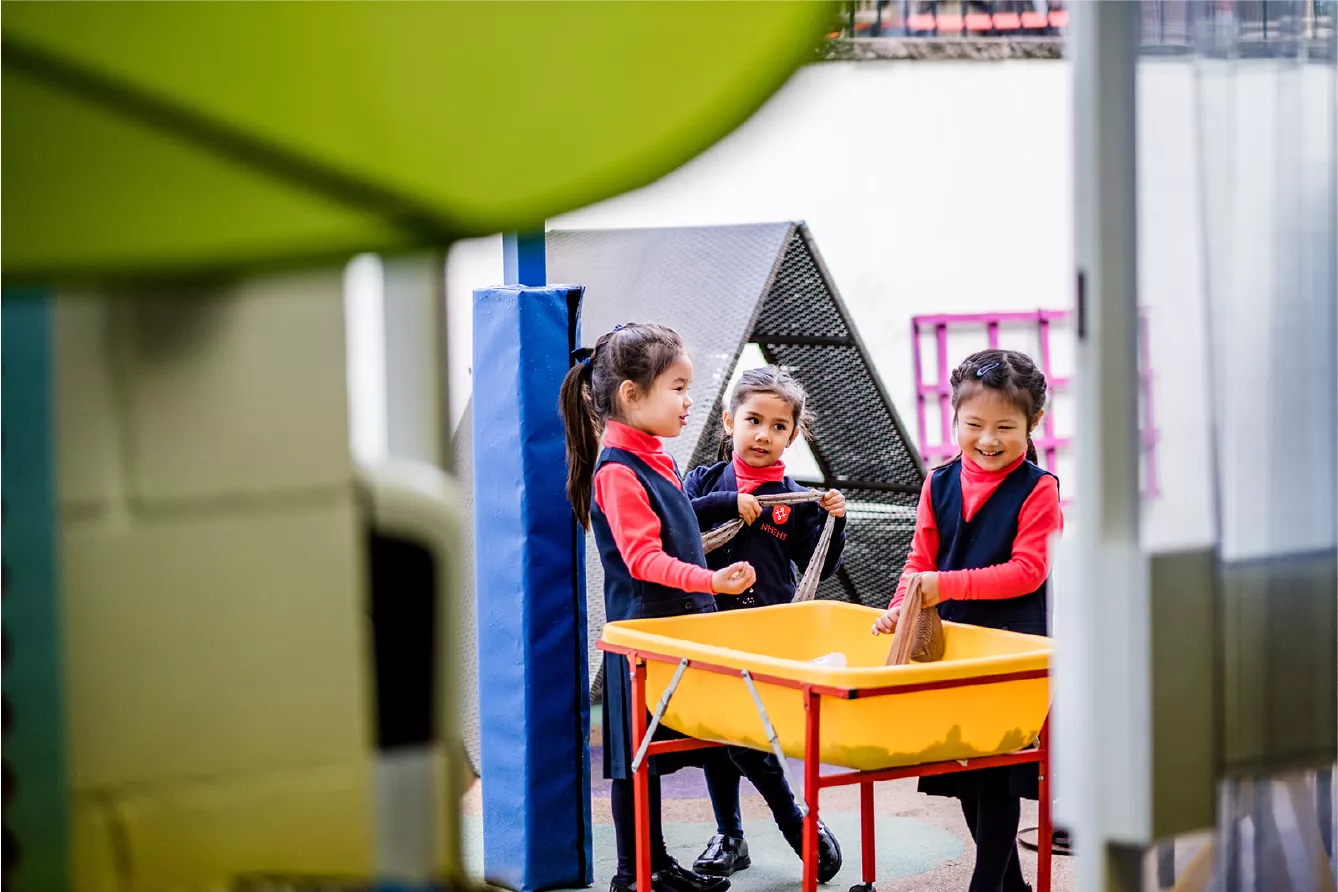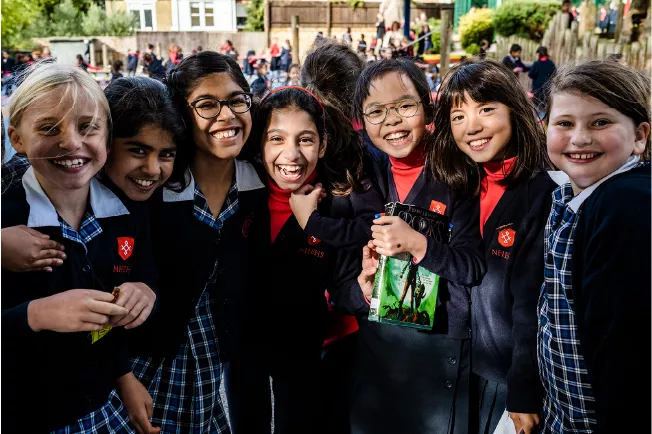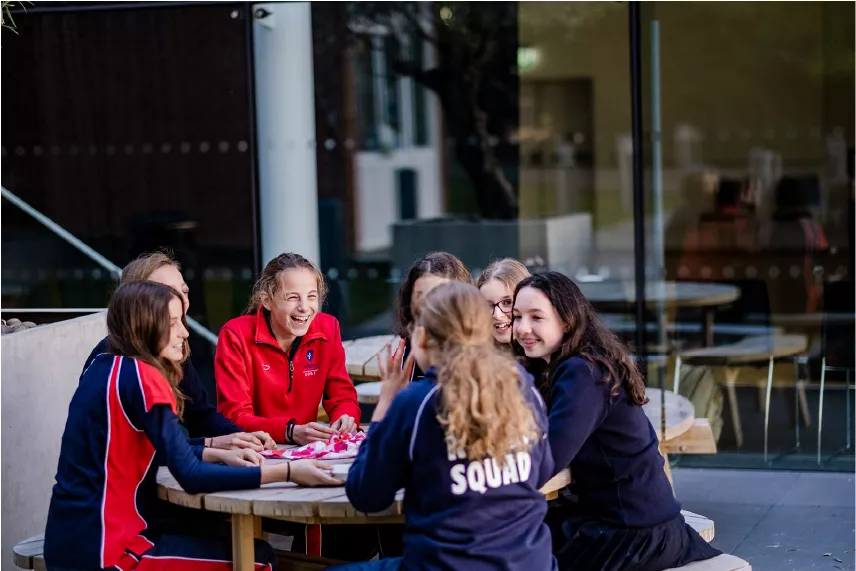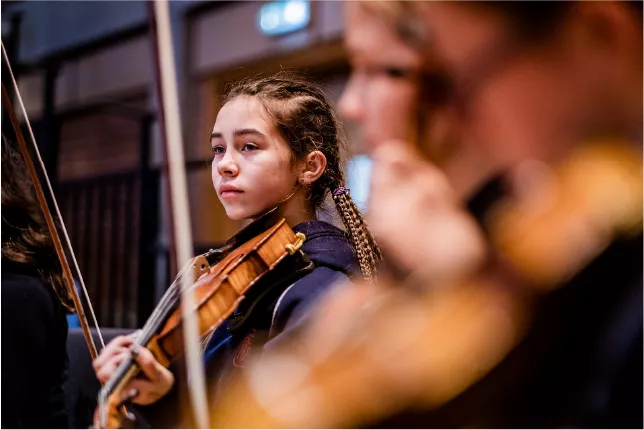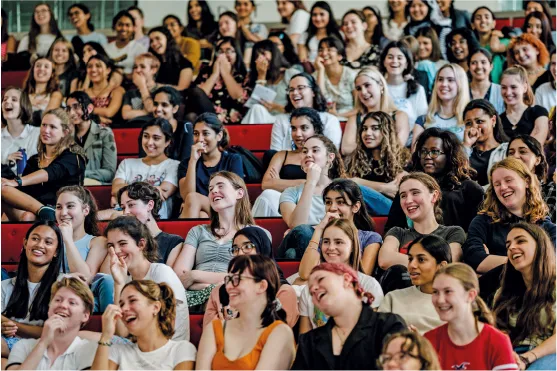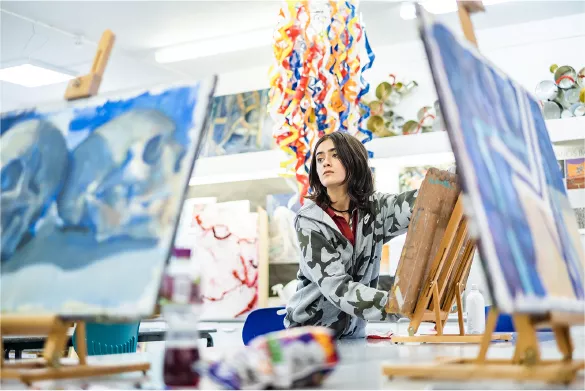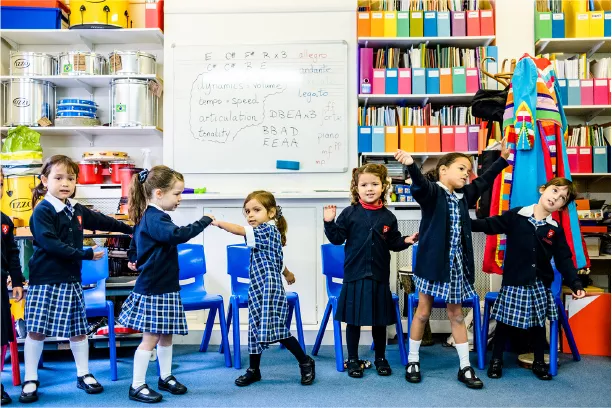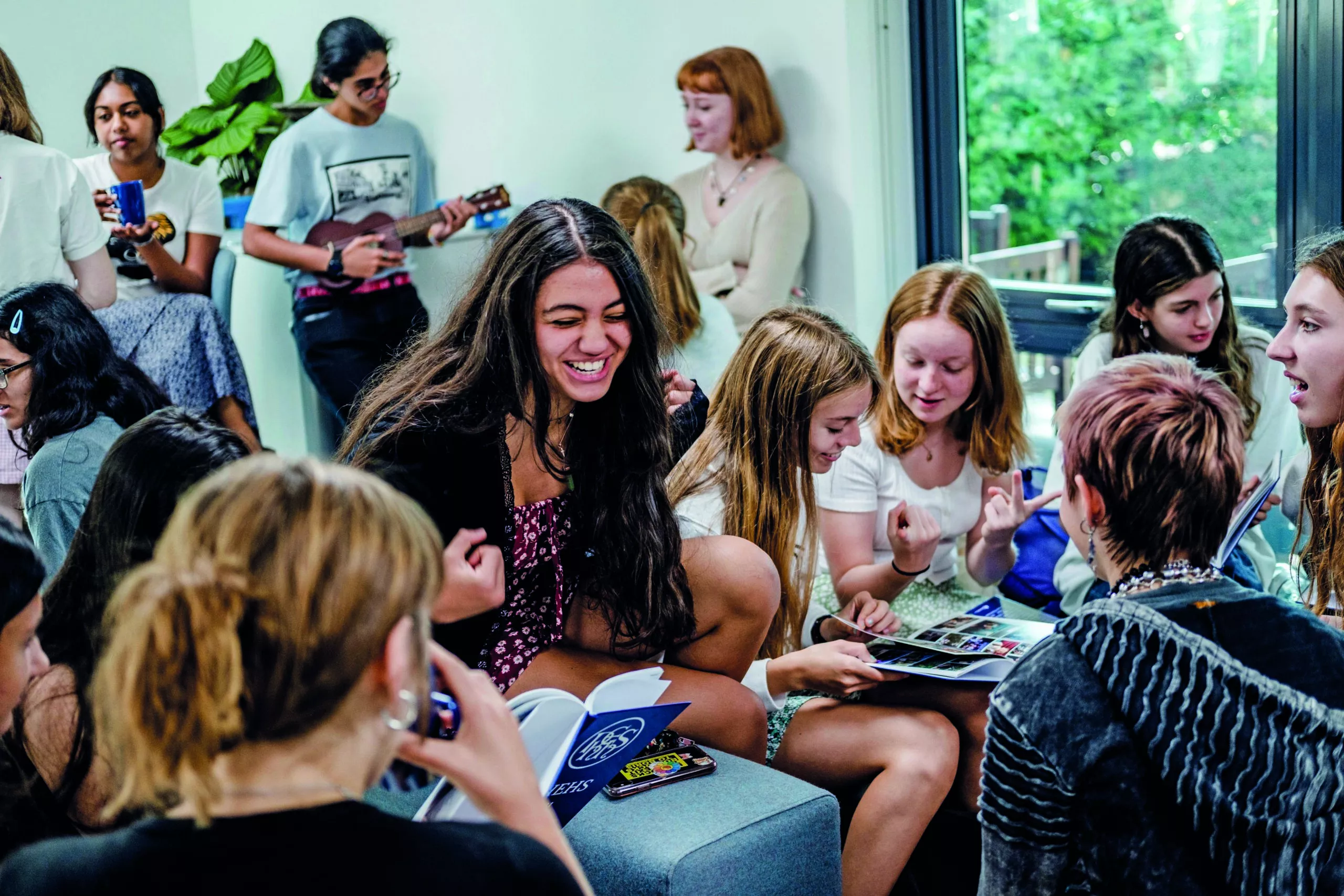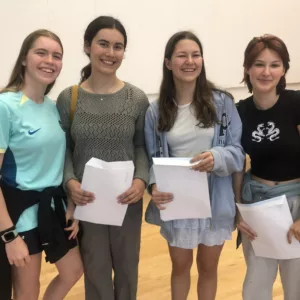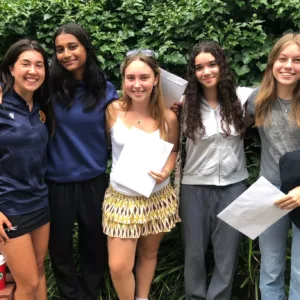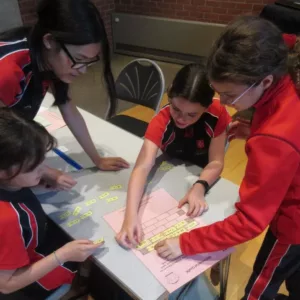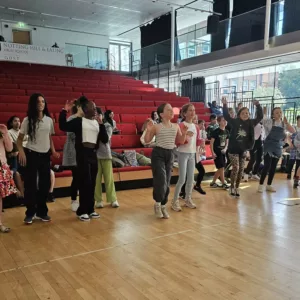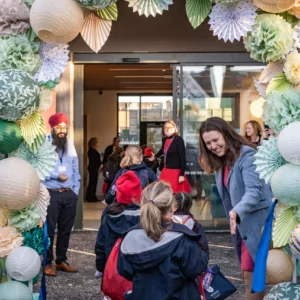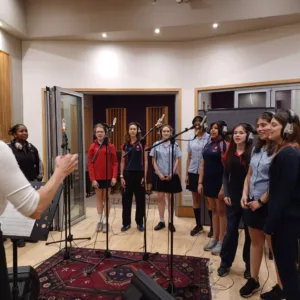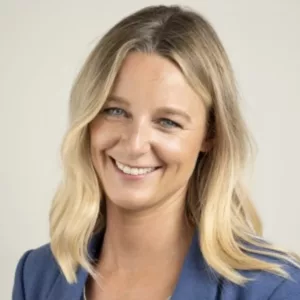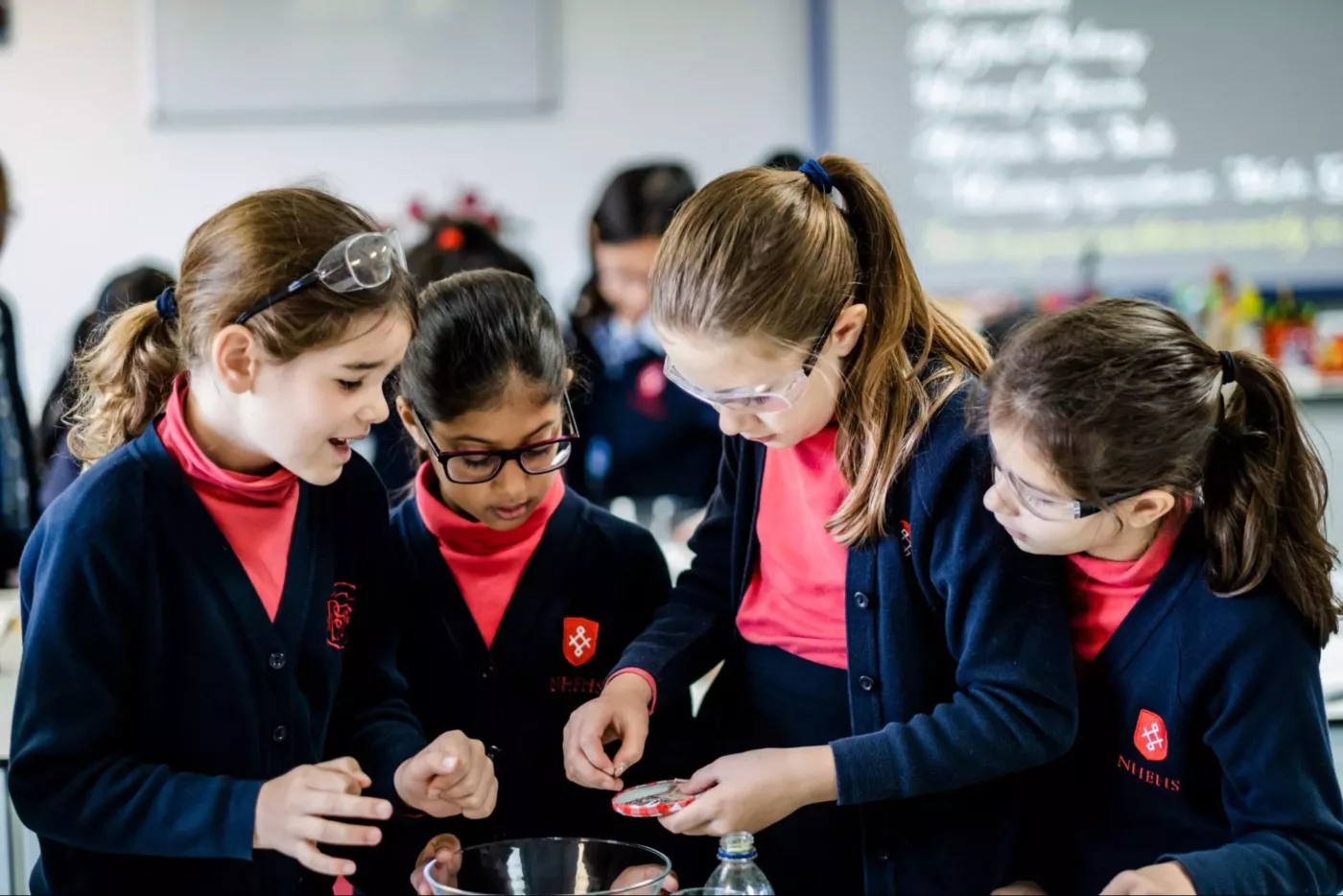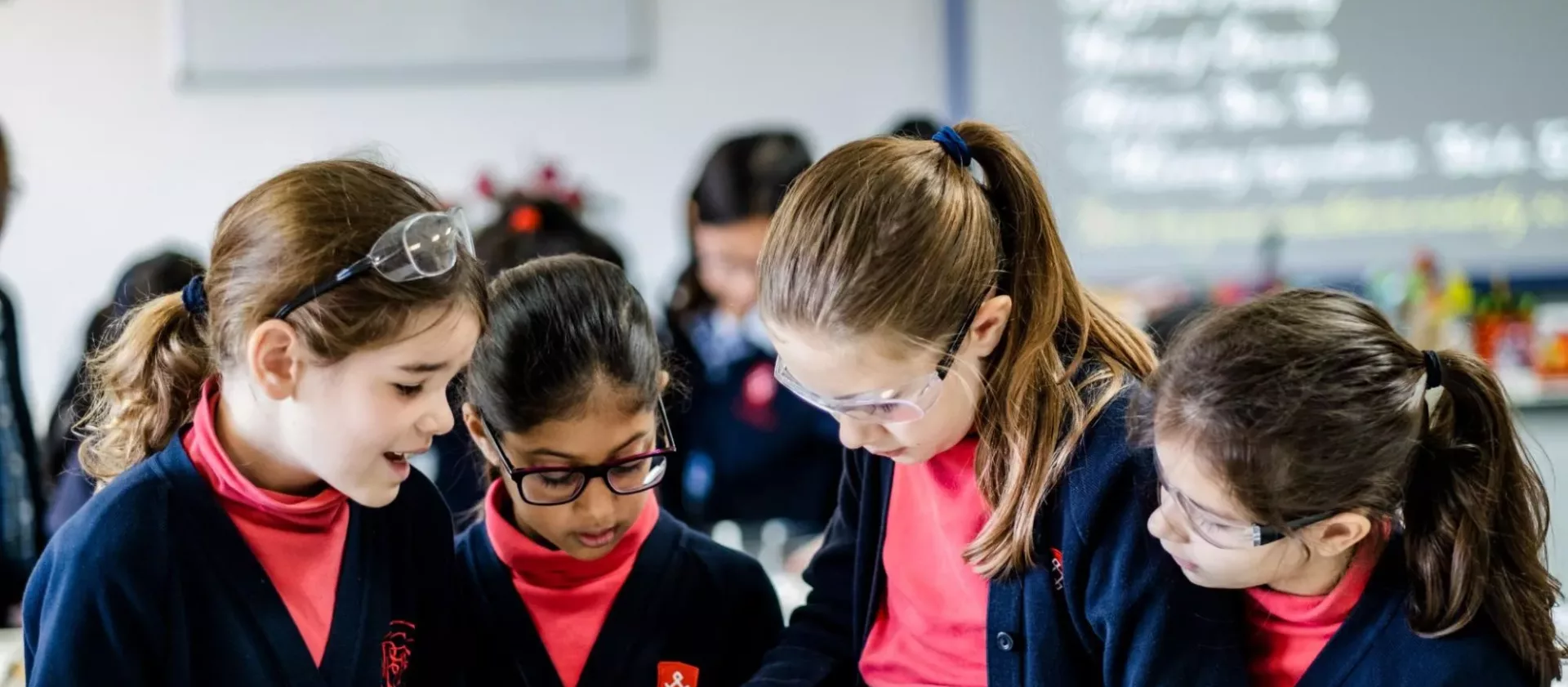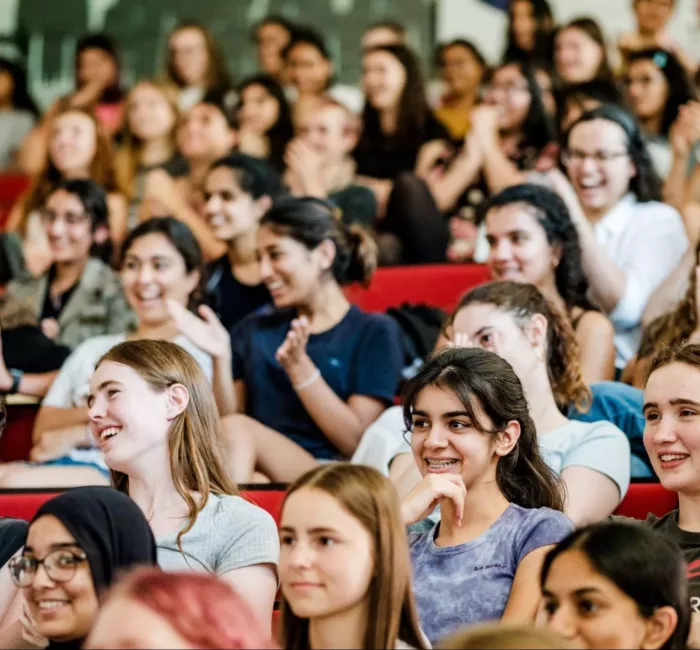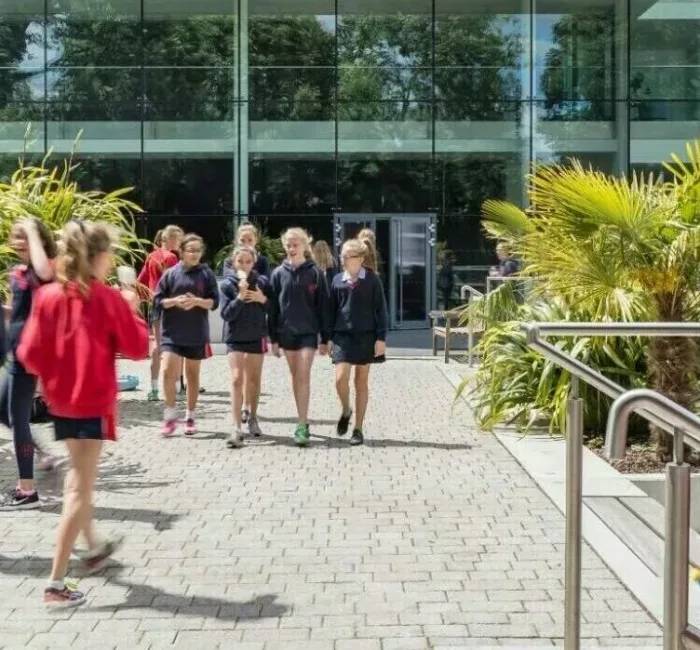Junior School
-
About the classesHow many girls are there in the Junior School? How many pupils are there in a class? What is the teacher-student ratio?
We have approximately 300 girls at our Junior School. There are two classes per year. In Reception, Year 1 and 2 (KS1) we have 20 pupils per class and from Year 3 onwards (KS2) there are 24 in a class. In KS1, each class has a class teacher and a teaching assistant. In KS2, each class has its own teacher with one teaching assistant shared between the two year group classes.
What is your Science provision?From Year 1 onwards our pupils enjoy specialist science lessons in our Junior Science Lab. We also hold an annual STEAM week where every girl and teacher in the Junior School participates in activities aimed at fostering a deep passion for Science. Children develop their scientific skills by conducting a range of practical investigations for each topic.
In addition to a popular STEAM Club held after school, there is also a Year 6 Science Leadership programme where pupils work as lab assistants in their break times when they help set up equipment for other year group lessons and support their younger peers.
What languages can the girls learn at Junior School?Girls learn Mandarin in lessons from Year 1 onwards. From Year 2 they are able to learn French and from Year 3 German in extra‑curricular clubs.
What is your music provision?Music is an important part of the curriculum with timetabled lessons for choir and music from Year 1 onwards with our Junior School Director of Music. In Year 2 girls are offered taster sessions to try out different instruments. From Year 3 onwards we offer individual private music lessons on most instruments (violin, harp, flute, cello, clarinet, recorder, drums, piano, keyboard) during school time.
Lessons are on a rota basis which means that the times of a girl’s lesson will change each week so they do not always miss the same lesson in class. There are also a number of instrumental and singing clubs for Years 3-6 before and after school.
What is your sports provision?There are games, gym, dance and swimming lessons at school, with 2-3 classes a week depending on age. All classes are taught by a specialist PE teacher. For the younger girls, much of the activity revolves around developing co-ordination, balance and ball skills before learning how to play netball, hockey, cricket and take part in athletics.
Girls from Year 5 and Year 6 can represent the school in fixtures and tournaments against other London schools, as well as the GDST netball, cross country, cricket, athletics and swimming rallies. All classes will swim at some point in the year (Reception in the summer term), using the indoor pool in the Senior School. Swimming squads and teams involve girls from Year 3 upwards. In addition to our annual Sports Day we also hold popular House sports competitions for cross country and netball.
For PE we have use of the Junior Hall as well as the shared facilities with the Senior School including the astroturf, indoor sports hall, dance studio and indoor swimming pool. For athletics we use the nearby Perivale Athletics Track.
What is your ICT provision?Girls have ICT lessons in Years 1-6 with our specialist IT teacher where they learn Computer Science and e-safety.
Pupils in Years 4-6 are also encouraged to sign up to be Digital Leaders promoting digital safety in the Junior School. Chromebooks are provided for all students from Year 4 onwards and all classrooms are equipped with interactive white boards.
How much homework is there?Girls in Reception begin with reading every evening. In Year 1 they will have some spellings to learn at home and girls in Year 2 and above will have regular homework.
This will build up from one piece per week in Year 2 to four nights a week in Year 5 and every night in Year 6. Homework is set for 30 minutes per night.
What is your SENDCO provision?We have a SENDCo who is in school three days a week to coordinate the provision for pupils.
She works with teachers to support girls within the classroom and provides additional support for girls in groups across all year groups.
Pastoral careWhat pastoral care do you offer?Class teachers are responsible for each girl’s academic and social development and girls are usually happy to talk to their teachers about any concerns they are having.
We work closely with parents to support the girls both emotionally and academically with many opportunities both formal and informal, to meet staff and share in your daughters’ progress. We also run a pastoral programme from Reception up to the Sixth Form.
Co-curricularDo you have a House system?Yes. We have four Houses – Darling, Austen, Fry and Seacole. Pupils join a House from Year 1 and are able to take part in House competitions and initiatives led by the Year 6 Captains and Vice Captains.
These include sing-offs, sports day, competitions for netball, cross country, swimming plus bake sales and charity initiatives. Pupils are also awarded House points by members of staff for being helpful, kind and thoughtful and working hard. To become a House Captain or Vice Captain, Year 6 pupils present their ideas to the rest of their House who then vote to choose the three leaders for the year. The much coveted House Cup is awarded every term based on the number of House points.
What trips do you go on?The Junior School curriculum includes many visits to museums, art galleries, theatres, performing arts venues and historical sites both locally and in central London. We also enjoy regular on-site visits by speakers, authors and workshop leaders.
The cost of all day trips is added to the fees.
Fees for the residential trips in Year 5 (one night of Bushcraft in Oxfordshire) and Year 6 (four nights at a PGL residential course in Dorset) are charged separately.
Which Clubs can the girls get involved with?We organise a number of co-curricular clubs and activities at Junior School which are held before school, during lunchtimes and after school. We believe children in Reception to Year 2 need time to socialise and play. So we try to limit clubs for children below Year 3 and we do not run any clubs for girls in Reception. There is a Year 1-2 Sports Club to help gross motor skills, a Year 2 Yoga Club and a Year 2 French Club.
Breakfast and After School Clubs are open to all girls from Reception upwards.
For sport, we have a mixture of selective and non-selective clubs ranging from Dance, Fitness Football, Hockey, Running to Swimming. In addition to the clubs, there are ‘Team’ netball, cross-country, hockey and cricket competitions as well as a ‘Team’ swimming gala/water polo events.
For Music our current list of Clubs include Aural Training, Chamber Ensemble, Choir, Flute Group, Orchestra, Recorder Club and String Ensemble. We also run the following internal clubs for Years 3-6: Art, Board Games, Craft, Debating, Drama, Eco Warriors, Fencing, French, German, Minimus, News Bites and STEAM. Our external clubs include Animation, Chess, Drama and Yoga. Our clubs’ provision changes on a termly basis but always aims to provide a wide variety of activities open to all the girls.
In Year 6 we also run a very popular Enterprise Project in the summer term during lessons where girls are encouraged to set up and run their own businesses, then sell their products at the Enterprise Fair.
What are your before and after school care/activities?Our Breakfast Club is from 7.30 until 8.20 am from Monday to Friday and is available to girls once they are in school full time in Reception. A light breakfast is served and girls can read or play and are walked to their classroom in time for registration.
Spaces are payable in advance and limited to 20 a day and are available on a first come first served basis through a booking system.
Our After School Club in Junior School runs until 6pm by our own experienced staff. It provides relaxed, fun activities or the opportunity to play, read or even do homework if girls wish.
Do you provide school lunches?All girls at Junior School enjoy school lunches provided by our in-house catering team.
The cost for this is added to the termly fees invoiced by GDST Trust Office see here for current fees.
Girls have a choice of either a daily hot meal (there is always a vegetarian alternative) or items from the salad bar. In addition to a main course and dessert, girls are also offered bread and fruit. Any allergies are catered for.
Do you have a school bus?We run a school bus service which is available to girls from Year 3 and above. This is run in partnership with Vectare, which offers an online booking and personalised journey planning tool on their website.
Find out more on school transport here.
Where do Year 6 girls go?The majority of our Junior School girls move on to the Senior School.
ParentsHow can parents get involved?We have a very active Parents’ Guild. All parents are automatically invited to become members of the Guild and are encouraged to take part in activities and initiatives. We also encourage parents to sign up as Parent Representatives for their classes and help out on school trips.
How do you engage parents in their daughters’ learning?Our ‘open door’ policy means that whatever your concerns, no matter how big or small, you can come and talk to us at any time and we are always happy to listen. Many small items of information can be dealt with via an informal word with your daughter’s class teacher at drop-off or pick-up time but appointments to see the Head or other staff are easily made. At the beginning of each term we will send you a Curriculum Statement which tells you what your daughter is going to be studying in the coming weeks. We also hold a series of Year group information meetings in the Autumn Term to tell parents about the curriculum and expectations for the year ahead.
You will have opportunities to discuss your daughter’s progress at formal parents’ evenings which are held twice a year in the autumn and spring terms and you will receive a written report at the end of each term. Our weekly email newsletter tells parents all about life at school and keeps you up to date on forthcoming events.
AdmissionsHow do we apply for Reception and what happens on the 4+ Assessment Day?
You can apply for a place in our Reception from any point up to the registration deadline. No priority is given to early registrants. On Assessment Day, the girls are in groups of 3 or 4 for a play assessment of around one hour. This takes place in late November or early December in the year before the girls are due to start Reception. We only assess girls in small groups with other girls who have birthdays around the same time of year, to make the assessment fairer.
How can we prepare for the 4+ assessment and what do you look for?
No preparation is needed. We find that saying to your daughter in advance that she is coming for a play with other girls has been helpful.Our experienced assessors are looking for girls who have the potential to thrive in our Junior School. We do not test numeracy or literacy skills.
What if my daughter is upset on the day?
If your daughter is upset on the day of the 4+ assessment and is unable to do the assessment, we are happy to reschedule for another time. Girls cannot do more than one assessment.
What if English is not my daughter’s first language?
We have many girls at school who speak a different language at home. We will take this into account as far as possible at the assessment but we will need to feel confident that she will be able to access the curriculum successfully.
Can we apply from overseas?
Yes. You are welcome to apply but your daughter will need to be assessed in person for Reception entry.
When do you make your 4+ offers?
Places will be offered to a group of girls.A second group will be put on a waiting list, should places become available. A third group will not be offered a place.
We send out offers in the post before the Christmas holidays. To secure your place you will need to pay the £1500 deposit by the acceptance deadline.
How do we apply for entry at 7+ and how will my daughter be assessed?
The assessment morning for 7+ takes place in the January of Year 2. There are four short papers – Maths, English writing, English comprehension and multiple choice verbal reasoning.Each paper is 30-40 minutes long with a break in between for snacks, drinks and playtime. Girls whose papers look promising will be invited back for a short interview with our Head of Junior School.
Offers of places will be sent out before February half term. To secure your place you will need to pay the £1500 deposit by the acceptance deadline.
What if we are not offered a place?
If you are not successful this time, you are welcome to re-apply when your daughter is slightly older.
Do you accept girls mid-year (occasional places) and how do we apply?
Yes, if there are spaces in the relevant Year group. Entry is by assessment appropriate to the year group. Please contact our Admissions Team to find out if there are any spaces available and advise on what to do next.
Do you accept girls into Year 6?
No – the last admission point into the Junior School is for Year 5.
I’ve missed all the admissions deadlines, what should I do?
Please get in touch with our admissions team for advice.
What is your sibling policy?
As we are a selective school, most siblings apply to join us but acceptance is not automatic and is always based on assessment.
Do you offer Junior School Scholarships and Bursaries?
We do not offer scholarships and bursaries in the Junior School but these are available in the Senior School and Sixth Form. For more information, please see here.
Can I request a tour?
We hold regular open days which are bookable on our website here.Senior School
-
11+ Application & AssessmentHow many join the Senior School at 11+?
We have spaces for approximately 50-55 students from other schools who will join us for Year 7 entry together with 45-48 pupils who come up from our Junior School.
Do you accept overseas applications?Yes. Assessment and interviews can be done online but applicants will need to have resident status in the UK on a parent’s visa, as we are not licensed for student visa sponsorship.
How will you assess my daughter for 11+ entry and what does the assessment involve?There are three elements to each 11+ application:
– Entrance test: all applicants will be invited to sit the entrance test in late November or early December. This is computer-based and can be taken either at the applicant’s current school, if they agree to host a sitting, or at any Consortium school to which she has applied.
– School reference: we apply to every applicant’s school in late November for a confidential reference for your daughter.
– Interview: in January, all applicants who have sat the Consortium test will be invited to attend a short, informal interview.
What entrance test will my daughter need to take?Notting Hill & Ealing High School (NHEHS) is part of the London 11+ Consortium, and all 14 schools in the Consortium share the same 11+ admissions test. For 11+ 2024 admissions, the Consortium is using a bespoke entrance test, which will be taken online and will consist of five modules, in this order: Maths; Non-Verbal Reasoning; English comprehension and verbal reasoning; Problem Solving, and Analysis. The test takes 100 minutes to complete, and applicants will be given a break part-way through.
The first three sections of the test are adaptive, which means that the level of difficulty of the questions adapts according to the responses provided by applicants. The final two sections are non-adaptive, and will differ on each of the three exam dates to ensure the security of the test.
How should my daughter prepare for the test?Practice tests are not available and no special preparation is required. However, it may be helpful for applicants’ confidence if they are familiar with the nature and style of the test.
Familiarisation materials will be available on the London 11+ Consortium website in the autumn ( http://london11plus.co.uk/ ). Whilst a degree of practice may help children to build their confidence and to feel secure in what is expected of them, repeated practice is not encouraged.
When and where should my daughter sit the entrance test?There are three options for your daughter to sit the entrance test:
- Here at NHEHS on Tuesday 3rd December 2024.
- At another Consortium school to which she is also applying.
- At her own primary school, if they are holding a test sitting.
My daughter’s school is not hosting the test. What should I do?Please just let us know. Your daughter will be able to sit the tests at NHEHS or at any other London 11+ Consortium school to which she has applied.
We live abroad. Can our daughter take the entrance test abroad? What about the interview?Yes, it is possible for applicants to take the entrance test overseas. Please ask your daughter’s current school if they can invigilate the test. If this is not possible, please contact the British Council in your country to see if they have suitable facilities nearby. If neither of these options are possible, parents will need to find an alternative venue which provides invigilation/exam services.
We do not allow candidates to be tested at their home, a tutor’s house or anywhere which is not considered a professional venue.
You will need to provide details of the venue arrangements to us and we will communicate directly with the venue in order to provide candidate login details and supporting documentation. Interviews will be conducted online.
What happens on the 11+ assessment day if my daughter sits it at NHEHS?If your daughter comes to NHEHS to sit her entrance test, she will be allocated to one of two sittings on the test date. She will be in a classroom with a number of other girls and an invigilator, and will take the test on either a desktop or laptop computer (we will provide a mouse for laptop users). There will be a break part-way through the test, where we provide refreshments.
We will also provide all applicants with pencils and rough paper, for any working out they need to do. We aim to make the test session as friendly and welcoming as possible, as we know that your daughter may be nervous when she comes in to take her test.
Do you allow for extra time for students with SEND?If your daughter requires any specific access arrangements, you will need to indicate this in the relevant section of the registration form, and will be asked to upload a professional report with your application.
The report and any recommendations contained within it will be reviewed by our SENDCO, who will confirm if we are able to award extra time for the test.
My daughter has special educational needs. Is the entrance test accessible for her?The entrance test is accessible to all applicants with a variety of special educational needs or disabilities. Reasonable adjustments may be applied, the nature of which will depend on the applicant’s specific needs.
You must inform us, when making your 11+ application, about any specific needs your daughter may have.
There is a section on our 11+ registration form for this purpose and you should also upload a copy of any educational psychologist’s report or similar professional report. Where appropriate, applicants can be given additional time to complete each test element.
What is NHEHS looking for?NHEHS is an academically selective school and we are looking for pupils who will thrive in a scholarly environment with a wealth of extra-curricular activities on offer. We understand that our 11+ applicants are young and their education will have been disrupted by the pandemic. We are looking for potential, and for curious pupils with a love of learning, who will take advantage of the opportunities on offer at NHEHS.
When will I hear if my daughter has been offered a place?Offers will be made on Friday 14th February 2025. The deadline to accept is Thursday 6th March 2025 at 12 noon. To secure your place you will need to pay the £1500 deposit and submit all acceptance paperwork by the acceptance deadline.
Do you have a waiting list process for 11+?Yes. Places will be offered to a group of girls. A second group will be put on a waiting list, should places become available. A third group will not be offered a place.
If your daughter is on the waiting list, we will aim to let you know as soon as possible whether we will be able to make an offer of a place, but this does not always happen before the main March acceptance deadline, and there can be movement with the waiting list right up until the end of the summer holidays.
Once I have accepted a place, will my daughter be able to visit the school before the start of the school year?Yes – we hold an induction event in the summer term where the students can get to know each other and their tutors. We also hold a new parents evening in June for parents to meet each other and our staff.
Yes – we sometimes have occasional places available in Junior and Senior School and are happy to welcome students into most year groups in the school. See here for more information.
Bursaries & ScholarshipsDo you offer scholarships and/or bursaries? What is the difference between the two?
We offer both bursaries and scholarships at 11+. Bursaries are means tested and may be up to 100% of fees while scholarships are generally 10 – 20% of fees.Ensuring that talented and academically gifted girls from all backgrounds have access to education at Notting Hill & Ealing High School is integral to the school’s vision and ethos. We want to offer the brightest girls the chance of joining our community regardless of their parents’ ability to pay school fees so we encourage you to apply for one of our means tested bursaries in the Senior School on entry to Year 7 and the Sixth Form. Please find more information here.
We offer 11+ academic, music and sport scholarships. All 11+ applicants will be entered automatically for the academic scholarship (there is no separate scholarship test).
Junior School pupils are assessed separately. To apply for the Music and Sports Scholarship, applicants will need to return the relevant application form, then the Directors of Music and Sport will shortlist the applicants who they wish to see for assessment.
The Sport assessment and Music auditions will take place in mid-late January. For more information on scholarships please see here.
AcademicWhat do the students study in Year 7?
The aim of the curriculum in Year 7 is to introduce your daughter to a broad range of subjects to provide her with a firm foundation on which to build in later years. Each period is 35 or 40 minutes long with 40 periods per week and allocated as follows:– Art, Biology, Chemistry, Physics, Drama, Geography, History, PRE (Philosophy, Religion & Ethics), Music – 2 periods per week
– English, Maths – 4 periods per week
– Modern European Languages, Mandarin – 3 Mandarin and 3 European Foreign Languages (French/German/Spanish) periods a week
– Design Technology, Computer Science – 2 periods per week for half the school year
Are students put into sets for any subjects?
There is no setting in Year 7. The only subject where students are put into sets is Maths, which is from Year 8 onwards. The four Maths sets are flexible and students can easily be moved between sets if they are better suited to the pace of a different group.
How large are the class sizes?
There are four tutor groups per year of around 24 students up until the end of Year 11. Class sizes by subject vary.
Do students study all three sciences or are they combined?
Physics, Chemistry and Biology are taught separately by specialist subject teachers from Year 7 onwards. All students work towards the Science Triple Award, leading to three IGCSE qualifications in the separate sciences.
What languages do students take in Year 7?
In Year 7, all students study Mandarin. They also study French, German and Spanish in a carousel system, giving them exposure to both the language and culture.Towards February half term students will choose one of the three European languages and may choose to either continue with Mandarin or replace it with a second European language. Latin is taught from Year 8. Classical Greek may be taken for GCSE from Year 10.
What provision do you have for bilingual girls?
During the carousel bilingual students are offered bespoke resources in language lessons in Year 7 to ensure that they are stretched and challenged. After the carousel students are encouraged to opt for two new languages to study in Y8/9 and take part in the co-curricular club in their mother tongue language. Bilingual students usually take the IGCSE in their language in Y10 or if students join timetabled lessons with their year group in Y11.
What is the music provision at the school?
We have a 266 seater Recital Hall, 16 practice/teaching rooms. From Years 7 – 9 music is part of the curriculum and we provide an exciting and engaging programme which allows all students to develop through listening, appraising, performing and composing music. The curriculum is relevant and innovative, covering a wide range of musical styles and incorporating elements of music technology. Performing is strongly encouraged, with a clear focus on ensemble music making within the class, to hone existing instrumental skills and also develop potential in new ones. Discussion and debate are also encouraged, for, as well as being regarded as integral to the compositional process, they support the Department’s aim to build confident, articulate and independent musicians. Music is offered for GCSE and A level.In addition, a large number of girls have private tuition from our staff of specialist and highly qualified visiting music teachers. In Year 7, students also have the opportunity to learn an ‘endangered instrument’ subsidised by the school.
Outside of lessons, there are over 30 music clubs or groups including the student run A Capella, chamber music, Choirs (both auditioned and un-auditioned), Orchestras (Session, Symphony, Chamber), Conducting Club, Wind Band, Jazz Band, Rock Bands, Percussion Club, Bassoon Quartet, Flute Ensemble, Grade 8 Aural. There are multiple concerts every term, including the annual Musician of the Year competition, informal Tea Time concerts, workshops with visiting professionals, the biannual school production in collaboration with the drama department and other collaborations with professional organisations.
We also offer Music Scholarships for both 11+ and 16+ entry.
What provision do you have for Design & Technology (D&T?)
In Years 7 and 8 students study two periods of DT per week for half of the year on a carousel. Students are introduced to creative projects that develop their practical skills and confidence whilst using a range of tools and machines and also experimenting with a wide range of materials.They develop an understanding of the design process used by professional designers putting them in good stead to progress onto studying DT for GCSE and A Level.
Our well-equipped department blends traditional making techniques with modern CAD CAM which includes two laser cutters and four 3D printers.
What provision do you have for Drama?
As well as our Main Hall for school productions, we have a 100-seat studio theatre with lighting and sound and a drama workshop area. Drama is taught as part of the curriculum in Years 7, 8 and 9 as well as being offered at GCSE and A Level.We put on school productions every year and run a ‘Backstage Pass’ Club where students can train in Theatre Arts using the state of the art drama studio covering sound, lighting, stage management, set design, costume, hair and makeup.
What provision do you have for Art?
Students are welcome to come and work in our three, purpose-built studios in their free periods, at lunchtime and after school. Computers are all installed with digital scanners and digital software, including Photoshop and Final Cut Pro and the Sixth Form Studio has a printing press for etchings, monoprints and linocuts. There are facilities for colour printing and photocopying, digital cameras, camcorders and a suite of laptops. In Years 7-9 there is a varied scheme of work to ensure all students learn the formal skills through an exciting range of media, including painting, printmaking, digital manipulation and 3D construction.Students may take Art for GCSE and A Level. Participation in art is encouraged throughout the school, especially through the Sixth Form Art Reps’ annual charity fashion show, The Big Draw and our weekly co-curricular Art Clubs.
What sports do students play?
In the Autumn and Spring Terms, Year 7 students’ PE lessons include cooperative games, dance, gymnastics and swimming. In their Games Lesson they cover netball and hockey. In the Summer Term, they cover athletics, cricket, rounders and tennis.In addition, we run extracurricular clubs for athletics, badminton, cricket, cross country, dance, fencing, football, gymnastics, hockey, kickboxing, netball, rounders, rowing (indoor), self- defence, swimming, taekwondo, tennis, trampolining, water polo and yoga.
What sports facilities do you have?
We have a 25 metre indoor swimming pool, a 4-badminton court sports hall built to Sport England standards, a dance studio and an outdoor all-weather pitch.We also use the nearby facilities at Ealing Trailfinders Club, Perivale Athletics Track, Indian Gymkhana in Osterley and Old Actonians Sports Club.
What is your Computer Science provision?
Students are taught in alternating half-yearly blocks in Year 7 and 8 to enable them to benefit from smaller group teaching. Lessons in Years 7-9 are an exciting mixture of the highly creative and dynamic aspects of IT. They include developing skills such as using Photoshop and web design along with coding and an introduction to computational thinking.All students at Senior School are provided with Chromebooks. Students are encouraged to take part in the British Informatics Olympiad, the Amazon Longitude Explorer prize and Coding club. Pupils may take Computer Science for GCSE and A Level.
How much homework should students expect?
The amount of homework is carefully planned and distributed throughout the week. Parents are asked to help ensure that the appropriate time is spent on homework – approximately 20 minutes per subject.
What SEN provision is there?
Teachers are well informed about any learning differences that students may have, and work to support everyone to achieve. There are sessions of individual supported study for students who need them.PastoralWhat Pastoral Care do you offer?We want your daughter to be happy and confident, ready to learn and to take advantage of all that life offers, to be comfortable with herself and to be tolerant and supportive of others. Key figures in her pastoral care are her Form Tutor and Head of Year. The system of pastoral care is overseen by the Deputy Head, Pastoral, and staff work in close partnership with parents feeding back any concerns that we might have. We have specialist SEND staff, a school nurse and a fully qualified counsellor.
Year 12s act as Big Sisters to girls in Year 7. Big sisters provide practical help and advice on negotiating the first few weeks at a new school, acting as a friendly face and guide.
What is your PSHCEE (Personal, Social, Health, Citizenship and Economic Education) provision?The Personal, Social, Health, Citizenship and Economic Education (PSHCEE) programme allows each year group to tackle issues tailored to their age.
Students follow a course of personal and social education, which is run by form staff, in conjunction with the Head of Year and other visiting speakers. In accordance with Government guidelines, your daughter will take part in a programme of Health Education which includes Sex and Relationship Education and e-safety.
The school nurse, your daughter’s form tutor and other members of staff will also be involved in discussions on health issues, as part of the school’s personal and social education programme (PSHCEE).
What is your mobile phone policy?Students are allowed to bring a mobile phone into school for use on their journey. They are not allowed to use them during the school day and if a phone is seen it will be confiscated.
Co-CurricularIs there a House system?
Yes. Your daughter will be allocated to one of four houses – Eliot, Hepburn, Nightingale and Sharman. Year 12 students take the lead and there are light-hearted and more serious inter-house events including netball, hockey, University Challenges, House Shouts and charity events.
What co-curricular activities do you offer?
There is an extensive programme of clubs and activities (130+) for students before school, at lunchtime and after school.We hold a Co-Curricular Fair at the start of the Autumn Term so students can sign up for clubs. There are currently 70+ weekly interest clubs, 45+ sports clubs/activities, 20+ music and 4 drama clubs plus school shows/productions.
What trips do you offer for Year 7 & 8?
In their first week at school the Year 7s usually take part in a fun bonding day at HOAC (the Hillingdon Outdoor Activity Centre). Year 7 and 8 trips usually include various London Museums and Kew Gardens. At the end of Year 8 students take part in 4 day residential trips to France, Germany and Spain as part of their language learning.
What leadership positions do you offer?
There is scope for students to take on more than 200 leadership roles. In the Sixth Form we have our Head Girl and Head Girl Team, Games Captain, House Captains and Year 12 Subject Reps.Every form has two Form Reps and two charity Reps from Year 7-11. There are also Form Houses Reps, Year 8s have the chance to become a Lower School Leader, with more other Form-based roles for Year 7 and 8 include Sports Reps, Food Reps and Assembly Reps.
We also run leadership programmes for Years 9 and 10 with roles including Debating & Public Speaking Leaders, Journalist Leaders, Eco-Reps, Digital Leaders, Volunteering Leaders, Social Affairs Leaders, Interfaith Leaders, Science Publication Leaders, Wellbeing and Humanitarian Leaders.
TravelIs there a school bus service? How do students get to school?We run a school bus service which is available to girls from Year 3 and above. The partnership is run in partnership with Vectare.
Most senior school students come to school by a combination of walking and public transport (bus or tube from Ealing Broadway station).
Find out more information here.
Careers / UniversityWhat careers’ guidance/provision is there?We have a whole school approach to careers, with a school-wide programme, including includes workshops for various year groups starting with Year 7. Topics include Careers Skills & Employability, STEM, Motivation, Money Matters and Enterprise. Year 10 also receive Morrisby Guidance. There are also opportunities to get involved with the TenX Challenge and Tycoon Enterprise entrepreneurial competitions.
In the Sixth Form, one-to-one discussions are always available with our careers team. There are also GDST CareerStart Talks, the GDST Mini MBA and mentoring via the GDST Rungway initiative. We also run own Sixth Form Lecture Programme which covers academic and career areas plus also NHEHS alumnae “Careers Spotlight” and networking events. We also run our own “World Ready Programme” of seminars and workshops to teach students skills that they can use in higher education and beyond. Our own Parents’ Guild Careers Committee run careers fairs and workshops for students. We regularly update our Student noticeboard with the latest opportunities in Higher Education and Careers.
In preparation for university entrance, we hold mock interviews and encourage students to visit universities. Students are able to develop their academic understanding of the subjects that they might like to read at university by attending timetabled enrichment lessons. All Sixth Form also have access to the Unifrog platform, which allows students to explore the different University courses and Apprenticeships they may be interested in.
Where do Notting Hill students go on to after A Levels?We are proud of the way in which we help and support each of our students in getting to the next stage in their educational journey.
Our Sixth Formers achieve outstanding results in public examinations and go on to study a wide range of subjects at a broad range of institutions in the UK and abroad.
Sixth Form
-
16+ Applications & Admissions
How and when are applicants for the Sixth Form assessed?
Assessments are held in the November of Year 11. All applicants sit 30 minute written papers in each of their proposed A Level subjects. Students whose papers look promising are subsequently invited in for interviews with the relevant Heads of Departments and Head of Sixth Form.Offers are sent out in early December. Offers are conditional based upon GCSE grades. For entry into our Sixth Form we usually expect a grade 9 or 8 in your chosen A Level subjects and a minimum of 8 GCSEs at grade 8 or above.
I want to study a new subject at A Level. How will I be assessed for this?
You will be given a beginner level subject paper in your chosen subject.
If I missed the application deadline, can I still apply?
Even if the deadline has passed, we may still be able to receive your application, so please do contact our admissions team.
Can I apply after receiving my GCSE grades in August?
We expect to have filled our available spaces by August but please do contact us on results day if you have achieved a majority of 8 and 9s at GCSEs.
Can I change subjects after submitting my application?
Yes, of course! We understand that your choice of subjects may change during the year. Please do get in touch to discuss your options with us.
If I missed the Sixth Form Open Afternoon, can I arrange a tour of the school?
Yes – please do get in touch with our Admissions team to arrange an individual tour of our Sixth Form Centre and meet our Head of Sixth Form.
Do you accept overseas applications?
Yes, we do accept overseas applications. Your assessment and interviews can be carried out online but we are not licensed to sponsor student visas.
What happens if I don’t make my GCSE grades?
All students holding offers are given an appointment to see us on GCSE results day, to bring in their grades and have their places confirmed. If a student with an offer has not obtained the expected grade in one or more of her GCSE subjects, this appointment is an opportunity for us to discuss possible options, which can sometimes include a revised offer for slightly different A levels.
Bursaries & ScholarshipsDo you offer scholarships and/or bursaries?Yes. We offer means-tested bursaries up to 100% of fees. Scholarships in the Sixth Form may be awarded for academic, art, sport, drama and music.
What is the difference between a scholarship and a bursary?Bursaries may be up to 100% of fees while all 16+ scholarships are generally 5-10% of the overall tuition fees over the two years in the Sixth Form.
Who can apply for a bursary?Ensuring that talented and academically gifted girls from all backgrounds have access to education at Notting Hill & Ealing High School is integral to the school’s vision and ethos.
We want to offer the brightest girls the chance of joining our community regardless of their parents’ ability to pay school fees so we encourage you to apply for one of our means tested bursaries in the Sixth Form.
Please find more information here.
Bursaries are awarded according to family circumstances and academic performance, as shown in the entrance test. Families who think they may be eligible should indicate this on the NHEHS Registration Form. They will be sent individual log-on details and an online form to complete.
There is more information on the GDST website here.
What are the Sixth Form scholarship requirements?16+ Academic Scholarship
Candidates are first required to sit the normal written papers for their proposed A Level subjects. If they are selected for an interview, they will then be invited to take the scholarship paper along with our own Year 11 students.16+ Art Scholarship
Candidates will be asked to submit a portfolio of their art work. Awards are made on the basis of the quality of this work and commitment to the subject, both in and outside of school.Candidates are expected to demonstrate a high level of competence, as well as originality and effort, and show they would make a positive contribution to the Art Department. Candidates are expected to study Art at A Level.
16+ Drama Scholarship
Candidates will be invited to audition: this may take the form of a practical ‘audition’ (preparation & delivery of a monologue of no more than 2 minutes in length. Alternatively, candidates may offer a short presentation detailing the technical or design contribution they have made to a performance. This could include: set design, costume, stage management, make up design, lighting, sound or play direction.16+ Music Scholarship
Candidates should be playing at Grade 7 standard or above on their main instrument (can include voice) but do not need to have taken grade exams. Candidates will be invited to audition and awards are made on the basis of musical talent and commitment to music in or outside of school. A history of active participation in the musical life of their current school is expected, including ensembles, orchestral or choral groups. Candidates will be expected to make a strong commitment to the life of the Music Department. Candidates are not required to study Music at A Level.16+ Sport Scholarship
Candidates may be asked to take part in the following as part of the assessment process: A Senior Squad training session in a games lesson or co-curricular club; A practical ‘leadership’ session where the candidate leads a small group of Year 7 students in the sport of their choice in a school club session.Awards are made on the basis of achievement and commitment in sport and/or outstanding sporting potential. Applicants must be able to make a strong commitment to school sports teams and be able to provide strong evidence of previous commitment, ideally in more than one sport. There should be commitment both in and out of school, eg at local club, regional or national level. It is preferable that candidates are competing at County Level or above in either swimming, waterpolo, netball or hockey; however evidence of high levels of commitment and achievement at club level in one of these sports is acceptable. Scholarship holders are expected to contribute fully to the sporting life of the school in more than one sport, and demonstrate talent, leadership skills, commitment and enthusiasm.
AcademicHow many A Levels do students usually study?
In order to provide space for broader & deeper learning, time for students to play a full role in leadership & extra-curricular activities, most of our Sixth Formers will study three A Levels.In some cases, a student may wish to study four A Levels and we will consider this on a case by case basis. If you are studying Further Maths then this will be part of a programme of 4 A Levels.
Which A Level subjects are available?
You can choose any combination from the 26 subjects on offer as we build the timetable around you. Click here to see the full list of A Level subjects.
Do you offer the IB?
No.
How many hours of tuition do you receive in each subject?
For each A Level subject you will be allocated 8 periods of timetabled lessons. Each period is 40 minutes in length.
How are the Tutor Groups structured?
We have mixed tutor groups composed of students from both Years 12 and 13. On average there are seven students from each year group in each form.
What is the EPQ?
We strongly encourage students to study the Extended Project Qualification (EPQ) as this is a great opportunity to undertake a piece of undergraduate-style extended research on a topic of your choice. The equivalent of half an A Level, the EPQ also develops a broad range of important skills and is highly valued by universities. Throughout the Autumn Term of Year 12 you will follow a taught programme of research skills to aid you in this area.
Are there any additional courses I can take in the Sixth Form?
Students can also opt to study one of four Short Courses: Photography, the GDST Diploma, Italian (these are all one year courses) and Sports Science AS Level (taught across two years). In addition to these optional courses you will also follow an Enrichment Programme which is closely linked to your chosen university course.
How large are the class sizes?
Class sizes vary depending on the subject but usually 2-12 students per class.PastoralWhat pastoral care do you offer in the Sixth Form?
In the Sixth Form our students’ wellbeing is exceptionally important to us. Each student is assigned a Sixth Form Tutor who will be their first port of call for any pastoral issue.
Throughout the school day, Sixth Formers are able to visit the school nurse should they need to and we have a team of counsellors who are also able to offer support on a confidential basis. We also believe in the benefits of physical exercise on mental health and compulsory PE lessons continue throughout the Sixth Form, taking place every Wednesday afternoon.
Our PSHCEE programme is carefully designed to meet the unique needs of Sixth Formers and we regularly consult our students to ensure that it continues to be relevant and applicable to them. As part of this programme we regularly invite external speakers to deliver talks on important topics. Hearing the voices of all our Sixth Formers is important to us.
We also have a range of student-led committees through which this is able to happen and we regularly implement the ideas that are brought to us.
Life in the SixthWhat are the facilities like in the Sixth Form?
The recently refurbished Sixth Form Centre is the hub of Sixth Form Life with a cafe, common room, garden, classrooms, study areas, digital careers library, and gym. Of course, you’ll also have access to all our senior school facilities on our main site too.
What is the dress code?
You are able to wear your own clothes in the Sixth Form. This is an opportunity for you to express your own dress style, but it must still be within the context of appropriate dress for a school environment. Our dress code is ‘neat casual.’ When Sixth Formers are involved with special occasions such as Open days, they should dress more smartly.
Do you have to stay on the school site during school hours?
As a Sixth Former, you are afforded increased independence. You will find that you now have study periods as part of your time table. If your study periods fall in the afternoon then you are able to go home at 2.30pm once you have fulfilled all of your other commitments.
What ICT provision is there?
Students are encouraged to bring in their own laptops and you will often use these in class. Bursary students will be provided with a school laptop if needed.
What sports are available to Sixth Formers?
Sport is thriving in our Sixth Form and we field teams in a variety of sports including netball, hockey, football, waterpolo, cricket and rounders. Each week you will have a timetabled PE lesson and we offer additional options including Yoga, Trampolining, Badminton and Zumba to name just a few.Co-CurricularWhat opportunities are there to get involved in volunteering and community initiatives?
Supporting charities is a big part of our culture and our Sixth Formers lead in this area as they come up with creative ways to raise both money and awareness. We also have a long tradition of volunteering whether offering a helping hand in a local care home or reading in one of our partner primary schools.
What leadership opportunities are there?
There is a wide range of leadership opportunities in our Sixth Form ranging from our Head Girl and Head Girl Team, Games Captain, House Captains and Year 12 Subject Reps. Our Year 12s also act as Big Sisters to girls in Year 7, giving practical help and advice at key points throughout the school year.
What are the trips for Sixth Formers?
We make the best of everything London has to offer in terms of galleries, museums and exhibitions to bring an extra dimension and excitement to your work. In recent years we have also enjoyed trips to Rome (Art History), New York (Economics), Washington (Politics) and several European destinations.
What clubs or co-curricular activities are there?
There is an extensive programme of clubs and activities (130+) for students before school, at lunchtime and after school, which are often led by our Sixth Formers. We hold an Extra-Curricular Fair at the start of the Autumn Term so students can sign up for clubs. There are currently 70+ weekly interest clubs, 45+ sports clubs/activities, 20+ music and 4 drama clubs plus school shows/productions. See here for more.
What enrichment activities are there?
All Sixth Formers are invited to our fortnightly Sixth Form Lecture Series, with speakers on medical ethics, writers, politicians, sportswomen and figures from business or the arts.
Do you organise events with other schools?
We have partnerships with schools both in the local area and overseas and organise regular online and offline events with them, including Multi-Medic Interview practice sessions and academic conferences and competitions.Careers & UniversityWhat support is there for university admission and careers?Our aim is to help all students to get to their first destination on leaving NHEHS, whether that’s a college in the USA, a Russell group university or an Art foundation course. We have a strong record of supporting entry into the most competitive universities including Oxford and Cambridge. Our expert guidance is delivered by a highly experienced Sixth Form team, led by the Head of Sixth and the Director of University Admissions. We have individual academic mentoring from subject specialists, with expertise in vocational as well as traditional school subjects, in order to be tailor for individual needs and interests. There is a bespoke programme of preparation for University Admissions and Aptitude Tests, with expert guidance for applicants, parents and families at Universities Talks and on a one-to-one basis. Year 12 and 13 have dedicated UCAS preparation time throughout the Sixth Form.
There is also an extensive and diverse universities programme from the GDST, including Oxbridge on Track and a USA universities programme. We run alumnae-supported careers and universities events, such as the Year 13 Alternative Prospectus, and also offer ongoing support for Alumnae university applications in year 14 (PQA).
Our Parents’ Guild also holds the annual NHEHS Careers Convention where students have the opportunity to speak to senior people from over 60 occupations and professions. For more information on Careers and University provision, please see here.
Do you provide support for specialist admissions tests for Oxbridge, and medical and dental schools, including interview practice?We offer a dedicated programme of support for Medicine, Veterinary Medicine and Dentistry, Law and Oxbridge, and offer extensive specialised interview practice, including virtual interview training.
Do you organise any work experience for students?We maintain a unique careers register of parents and NHEHS Alumnae, which can put you in touch with people willing to offer advice on specific careers on a one-to-one basis.
You will also have access to the resources of the GDST Alumnae Network, a unique club of 70,000 members in the UK and around the world, including networking sessions and careers opportunities in addition to our Careers fairs and Careers support with internships and work experience.
